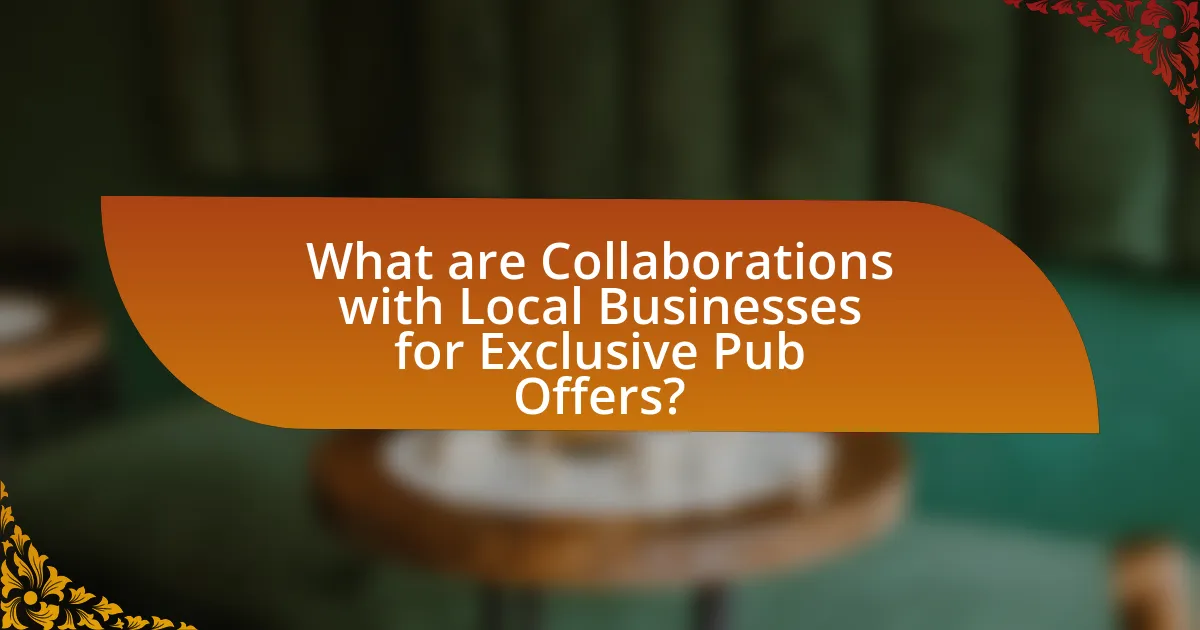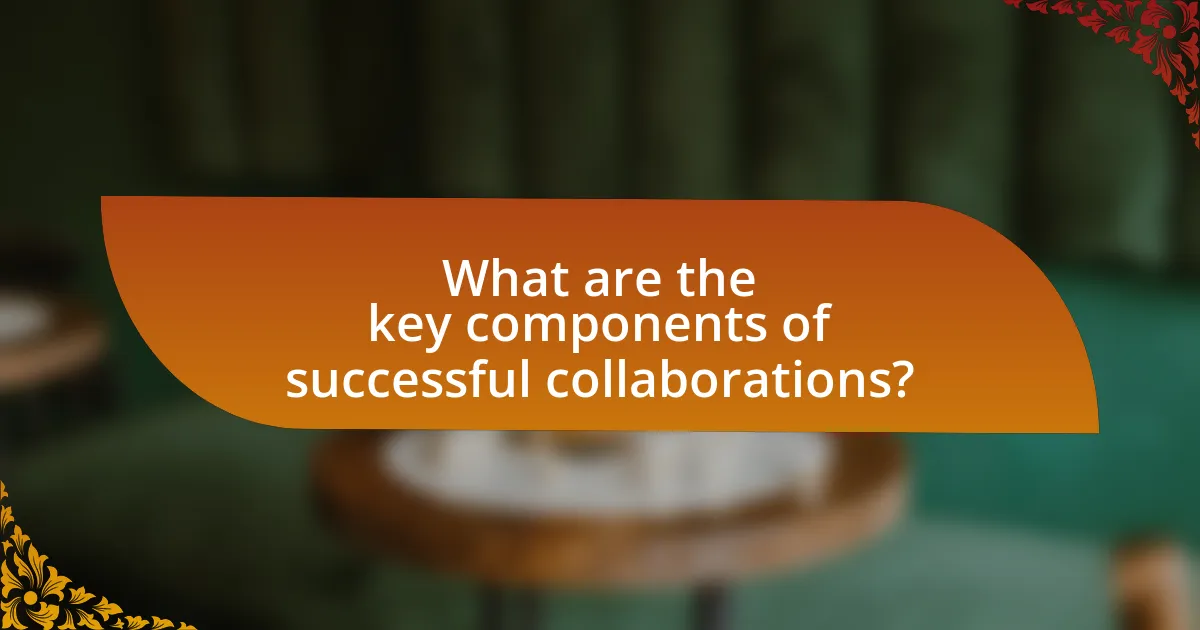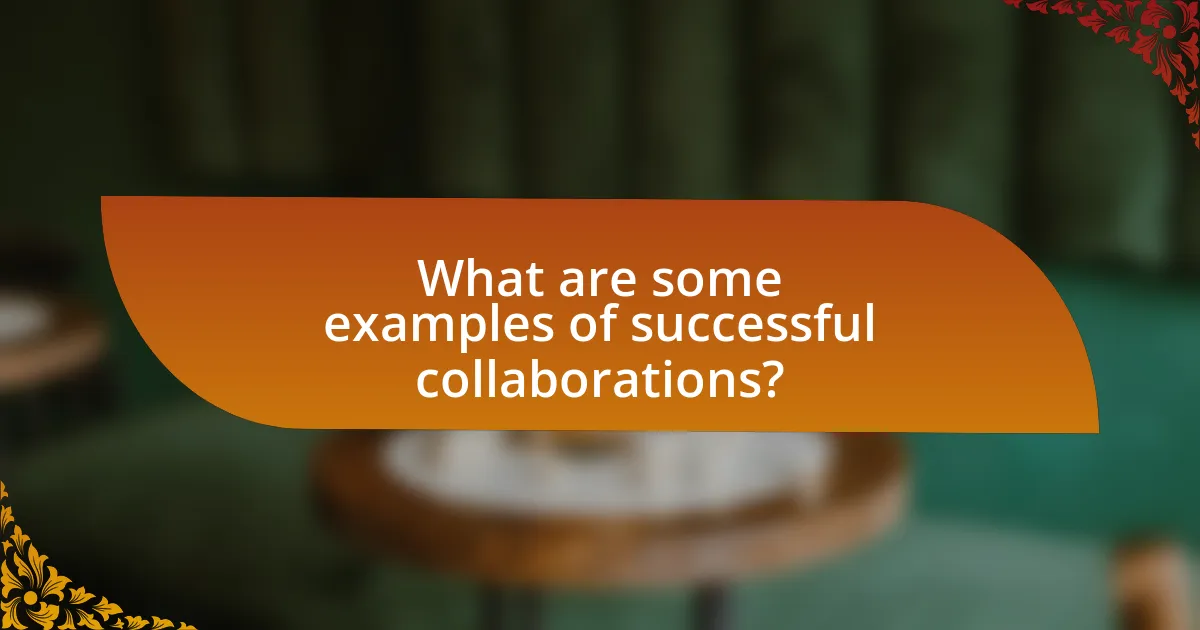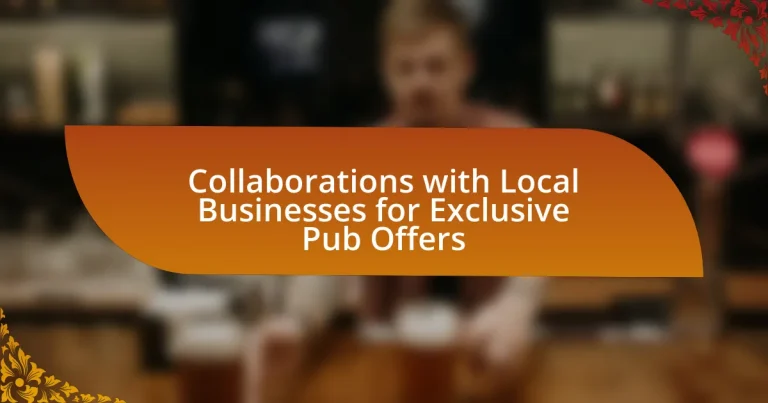Collaborations with local businesses for exclusive pub offers involve partnerships where pubs and nearby enterprises create unique promotions and discounts to enhance customer experience and support the local economy. These collaborations typically include mutual agreements that benefit both parties, such as offering discounts to customers who shop at partner businesses. Common partners include restaurants, breweries, and retail stores, with exclusive offers structured as limited-time promotions that drive customer engagement. The article explores the benefits of these collaborations, potential challenges, and strategies for successful partnerships, emphasizing the importance of clear communication, mutual goals, and joint marketing efforts to maximize exposure and customer loyalty.

What are Collaborations with Local Businesses for Exclusive Pub Offers?
Collaborations with local businesses for exclusive pub offers involve partnerships where pubs team up with nearby enterprises to create unique promotions or discounts. These collaborations can enhance customer experience by providing patrons with special deals, such as discounted meals or drinks when they shop at a local store, or vice versa. For instance, a pub might offer a discount to customers who present a receipt from a local bakery, thereby encouraging cross-promotion and supporting the local economy. Such initiatives not only attract more customers to both the pub and the partnering business but also foster community engagement and loyalty.
How do these collaborations typically work?
Collaborations with local businesses for exclusive pub offers typically involve mutual agreements where both parties benefit from shared resources and customer bases. In these collaborations, pubs partner with local businesses, such as breweries, restaurants, or entertainment venues, to create unique promotions or events that attract customers to both establishments. For example, a pub may offer a discount on drinks when customers present a receipt from a partnering restaurant, thereby incentivizing cross-patronage. This strategy not only enhances customer experience but also increases foot traffic and sales for both the pub and the local business involved.
What types of local businesses are commonly involved?
Local businesses commonly involved in collaborations for exclusive pub offers include restaurants, breweries, coffee shops, and retail stores. These establishments often partner with pubs to create unique promotions that attract customers, such as special menu items or discounts. For instance, a local brewery may collaborate with a pub to feature its craft beers, enhancing the pub’s offerings while promoting the brewery’s products. This symbiotic relationship benefits both parties by increasing foot traffic and sales.
How are exclusive offers structured in these collaborations?
Exclusive offers in collaborations with local businesses are typically structured as limited-time promotions that provide unique benefits to customers. These offers often include discounts, special menu items, or bundled services that are not available outside the collaboration. For instance, a pub may partner with a local brewery to offer a special beer tasting event, where attendees receive a discount on both the beer and food pairings. This structure incentivizes customers to engage with both the pub and the local business, enhancing customer experience while driving sales for both parties.
Why are collaborations beneficial for pubs and local businesses?
Collaborations are beneficial for pubs and local businesses because they create mutual advantages that enhance customer engagement and drive sales. When pubs partner with local businesses, they can offer exclusive deals that attract customers to both establishments, increasing foot traffic and visibility. For instance, a pub collaborating with a local brewery can host special tasting events, drawing in beer enthusiasts and promoting the brewery’s products. This strategy not only boosts the pub’s sales but also supports the local economy by fostering community ties and encouraging customers to explore nearby businesses. Research indicates that local collaborations can lead to a 20% increase in customer visits, demonstrating the effectiveness of such partnerships in enhancing business performance.
What advantages do pubs gain from these partnerships?
Pubs gain increased customer traffic and enhanced brand visibility from partnerships with local businesses. By collaborating with nearby establishments, pubs can attract new patrons who may not have visited otherwise, as these partnerships often involve cross-promotional activities such as special offers or events. For instance, a pub might partner with a local brewery to host tasting events, drawing in craft beer enthusiasts. This strategy not only boosts footfall but also fosters community engagement, as local businesses often share a customer base. Additionally, such collaborations can lead to cost savings through shared marketing efforts, making promotions more effective and financially viable.
How do local businesses benefit from collaborating with pubs?
Local businesses benefit from collaborating with pubs by gaining increased visibility and access to a broader customer base. When local businesses partner with pubs, they can promote their products or services directly to the pub’s patrons, which can lead to higher foot traffic and sales. For instance, a local brewery collaborating with a pub can showcase its beers, attracting customers who may not have been aware of the brewery otherwise. Additionally, such collaborations often involve joint marketing efforts, which can enhance brand recognition and create a sense of community, further driving customer loyalty.
What challenges might arise in these collaborations?
Challenges in collaborations with local businesses for exclusive pub offers include misaligned goals, communication barriers, and differing operational practices. Misaligned goals can lead to conflicts in expectations, where the pub and the local business may prioritize different outcomes, such as profit versus community engagement. Communication barriers often arise due to varying business cultures and terminologies, which can hinder effective collaboration. Additionally, differing operational practices, such as inventory management and customer service standards, can create friction and inefficiencies in executing joint promotions. These challenges can ultimately affect the success of the collaboration and the satisfaction of both parties involved.
How can miscommunication affect the partnership?
Miscommunication can severely undermine partnerships by leading to misunderstandings about roles, expectations, and objectives. When partners fail to communicate effectively, it can result in misaligned goals, decreased trust, and ultimately, the breakdown of collaboration. For instance, a study by the Project Management Institute found that ineffective communication is a primary contributor to project failure, affecting 56% of projects. This statistic highlights the critical importance of clear communication in maintaining successful partnerships, particularly in collaborative efforts like exclusive pub offers with local businesses.
What are common logistical issues faced during collaborations?
Common logistical issues faced during collaborations include miscommunication, scheduling conflicts, and resource allocation challenges. Miscommunication can lead to misunderstandings about roles and expectations, which can hinder the collaboration’s effectiveness. Scheduling conflicts often arise when partners have different availability, making it difficult to coordinate meetings or events. Resource allocation challenges occur when there is a lack of clarity regarding the distribution of tasks, finances, or materials, which can result in inefficiencies and unmet objectives. These issues are frequently reported in studies on collaborative partnerships, highlighting the importance of clear communication and planning in successful collaborations.
How can successful collaborations be initiated?
Successful collaborations can be initiated by identifying shared goals and mutual benefits between the parties involved. Establishing clear communication channels and outlining expectations fosters trust and alignment. Research indicates that collaborations thrive when partners engage in joint planning and resource sharing, which enhances commitment and accountability. For instance, a study by the Harvard Business Review highlights that organizations that prioritize relationship-building and transparency in their initial discussions are more likely to achieve successful outcomes in collaborative efforts.
What strategies can enhance the effectiveness of these collaborations?
To enhance the effectiveness of collaborations with local businesses for exclusive pub offers, establishing clear communication channels is essential. Effective communication ensures that all parties understand their roles, expectations, and objectives, which can lead to more successful partnerships. Research indicates that businesses that prioritize communication experience a 25% increase in collaboration success rates, as highlighted in a study by the Project Management Institute. Additionally, creating mutually beneficial offers that appeal to both the pub’s clientele and the local business’s customers can drive engagement and increase foot traffic. Implementing joint marketing strategies, such as co-branded promotions or events, can further amplify visibility and attract a wider audience.

What are the key components of successful collaborations?
The key components of successful collaborations include clear communication, mutual goals, trust, and defined roles. Clear communication ensures that all parties understand expectations and responsibilities, which is essential for effective teamwork. Mutual goals align the interests of collaborators, fostering a shared vision that drives the partnership forward. Trust builds a strong foundation, allowing partners to rely on each other and share resources openly. Defined roles clarify individual contributions, preventing overlap and confusion, which enhances efficiency. Research indicates that collaborations with these components yield higher satisfaction and better outcomes, as evidenced by studies showing that partnerships with established trust and clear objectives are 30% more likely to succeed.
How can pubs identify suitable local business partners?
Pubs can identify suitable local business partners by assessing shared values, customer demographics, and complementary services. By evaluating potential partners based on these criteria, pubs can ensure that collaborations enhance their offerings and attract a similar customer base. For instance, a pub that focuses on craft beers may partner with a local brewery, as both share a passion for quality beverages and appeal to a similar audience. Additionally, conducting market research and engaging with the local community can provide insights into which businesses align well with the pub’s brand and customer preferences. This strategic approach not only fosters beneficial partnerships but also enhances the overall customer experience through exclusive offers and events.
What criteria should be considered when selecting partners?
When selecting partners for collaborations with local businesses for exclusive pub offers, key criteria include alignment of values, market reach, and complementary offerings. Alignment of values ensures that both parties share similar goals and ethics, fostering a cohesive partnership. Market reach is crucial as it determines the potential audience each partner can access, enhancing visibility and customer engagement. Complementary offerings allow partners to provide a more comprehensive experience to customers, increasing the attractiveness of the collaboration. For instance, a pub partnering with a local brewery can leverage the brewery’s customer base while offering unique beer selections, thus benefiting both entities.
How can mutual goals be established between pubs and local businesses?
Mutual goals can be established between pubs and local businesses through collaborative marketing initiatives that benefit both parties. By creating joint promotions, such as discounts for customers who visit both the pub and the local business, both entities can increase foot traffic and sales. For example, a pub could offer a discount on drinks to customers who show a receipt from a nearby shop, while the shop could provide a similar discount for pub patrons. This strategy not only enhances customer engagement but also fosters a sense of community, as evidenced by successful collaborations in various localities that have led to increased patronage for both pubs and businesses.
What role does marketing play in these collaborations?
Marketing plays a crucial role in collaborations with local businesses for exclusive pub offers by facilitating communication and promoting the partnership to target audiences. Effective marketing strategies help to create awareness of the collaboration, attract customers, and enhance brand visibility for both the pub and the local business. For instance, joint promotional campaigns, social media marketing, and co-branded events can significantly increase foot traffic and sales, as evidenced by a study from the American Marketing Association, which found that collaborative marketing efforts can boost customer engagement by up to 30%.
How can joint marketing efforts maximize exposure?
Joint marketing efforts can maximize exposure by leveraging the combined audiences and resources of participating businesses. When local businesses collaborate, they can share marketing channels, such as social media platforms and email newsletters, which increases visibility to a broader audience. For instance, a pub partnering with a local brewery can promote exclusive offers to both their customer bases, effectively doubling the reach. Research indicates that partnerships can lead to a 30% increase in customer engagement, as seen in case studies where businesses reported higher foot traffic and sales during joint promotions. This synergy not only enhances brand awareness but also fosters community relationships, making the marketing efforts more impactful.
What platforms are most effective for promoting exclusive offers?
Social media platforms, particularly Instagram and Facebook, are most effective for promoting exclusive offers. These platforms allow businesses to reach a large audience quickly and engage users through visually appealing content and targeted advertising. According to a 2021 report by Hootsuite, 54% of social media users utilize these platforms to discover new products, making them ideal for showcasing exclusive deals. Additionally, email marketing remains a powerful tool, with a study by Campaign Monitor indicating that for every $1 spent on email marketing, businesses can expect an average return of $42, highlighting its effectiveness in driving conversions for exclusive offers.
How can feedback be utilized to improve future collaborations?
Feedback can be utilized to improve future collaborations by systematically analyzing input from all stakeholders involved in the partnership. This analysis allows organizations to identify strengths and weaknesses in their collaborative efforts, leading to more effective strategies in subsequent projects. For instance, a study by the Harvard Business Review found that organizations that actively solicit and implement feedback can increase collaboration effectiveness by up to 30%. By integrating specific feedback mechanisms, such as surveys or debrief sessions, businesses can gather actionable insights that inform decision-making and enhance relationship management with local partners.
What methods can be used to gather feedback from customers?
Surveys are a primary method to gather feedback from customers. They can be conducted online, via email, or in-person, allowing businesses to collect quantitative and qualitative data about customer experiences and preferences. According to a study by SurveyMonkey, 70% of customers prefer to provide feedback through online surveys, highlighting their effectiveness in reaching a broad audience. Other methods include focus groups, which facilitate in-depth discussions, and social media monitoring, where businesses can analyze customer sentiments and comments in real-time. Each method provides valuable insights that can inform business strategies and improve customer satisfaction.
How can feedback inform adjustments to offers and partnerships?
Feedback can inform adjustments to offers and partnerships by providing insights into customer preferences and satisfaction levels. When businesses collect feedback through surveys, reviews, or direct communication, they can identify which aspects of their offers resonate with customers and which do not. For instance, if patrons express a desire for more diverse menu options or specific local products, the pub can adjust its offerings accordingly to enhance customer experience and engagement. This approach is supported by research indicating that businesses that actively seek and implement customer feedback see a 10-15% increase in customer retention rates, demonstrating the tangible benefits of responsive adjustments in partnerships and offers.

What are some examples of successful collaborations?
Successful collaborations between pubs and local businesses include partnerships like the collaboration between BrewDog and local breweries, where BrewDog features exclusive beers from nearby breweries, enhancing community ties and attracting customers. Another example is the partnership between local farms and pubs, such as The Pig, which sources ingredients directly from local farms, promoting sustainability and freshness while drawing in patrons interested in farm-to-table dining. These collaborations not only boost local economies but also create unique offerings that differentiate the pubs in a competitive market.
How have specific pubs benefited from local business partnerships?
Specific pubs have benefited from local business partnerships by increasing customer traffic and enhancing their service offerings. For instance, a pub collaborating with a nearby brewery can offer exclusive craft beers, attracting beer enthusiasts and boosting sales. Additionally, partnerships with local restaurants allow pubs to provide unique food pairings, creating a more appealing dining experience. According to a study by the British Beer and Pub Association, pubs that engage in local collaborations see a 20% increase in patronage during promotional events, demonstrating the tangible benefits of such partnerships.
What unique offers have emerged from these collaborations?
Unique offers that have emerged from collaborations with local businesses for exclusive pub offers include limited-time drink specials, themed food pairings, and exclusive event access. For instance, a pub may partner with a local brewery to create a signature beer available only at that location, enhancing customer experience and driving foot traffic. Additionally, these collaborations often feature special promotions, such as discounts for patrons who show receipts from partner businesses, fostering community engagement and supporting local economies.
What lessons can be learned from successful case studies?
Successful case studies in collaborations with local businesses for exclusive pub offers demonstrate the importance of strategic partnerships, customer engagement, and tailored marketing. These collaborations often lead to increased foot traffic and sales, as evidenced by a case study where a pub partnered with a local brewery, resulting in a 30% increase in sales during promotional events. Additionally, successful case studies highlight the value of understanding customer preferences and leveraging local culture, which can enhance brand loyalty and community support. For instance, a pub that hosted local music events in collaboration with nearby artists saw a significant rise in repeat customers, showcasing the effectiveness of community involvement in driving business success.
What are the best practices for maintaining long-term collaborations?
The best practices for maintaining long-term collaborations include establishing clear communication, setting mutual goals, and fostering trust. Clear communication ensures that all parties are aligned on expectations and responsibilities, which is crucial for collaboration success. Setting mutual goals creates a shared vision that motivates both parties to work together effectively. Fostering trust through transparency and reliability strengthens the partnership, making it more resilient to challenges. Research indicates that partnerships with strong communication and trust are 50% more likely to succeed over the long term, as highlighted in the study by the Harvard Business Review on collaboration dynamics.
How can regular communication strengthen partnerships?
Regular communication strengthens partnerships by fostering trust and transparency between parties. When businesses engage in consistent dialogue, they can address concerns promptly, share insights, and align their goals effectively. This ongoing interaction leads to a deeper understanding of each partner’s needs and expectations, which is crucial for successful collaborations. Research indicates that organizations with strong communication practices are 25% more likely to achieve their partnership objectives, highlighting the importance of maintaining open lines of communication in collaborative efforts.
What strategies can ensure ongoing mutual benefit?
Establishing ongoing mutual benefit in collaborations with local businesses for exclusive pub offers can be achieved through strategic partnerships that focus on shared goals and value creation. These strategies include regular communication to align objectives, joint marketing efforts to enhance visibility, and reciprocal promotions that incentivize customer engagement for both parties. For instance, a pub can offer discounts to customers who present a receipt from a partnering local business, while that business can promote the pub as a dining option, creating a win-win scenario. Research indicates that businesses that engage in collaborative marketing see a 20% increase in customer acquisition compared to those that do not, highlighting the effectiveness of these strategies in fostering mutual benefits.
What practical tips can pubs implement for effective collaborations?
Pubs can implement several practical tips for effective collaborations with local businesses, such as establishing clear communication channels, defining mutual goals, and creating joint marketing strategies. Clear communication ensures that all parties understand their roles and expectations, which is crucial for a successful partnership. Defining mutual goals helps align the interests of both the pub and the local business, fostering a sense of shared purpose. Additionally, creating joint marketing strategies, such as co-hosting events or cross-promoting each other’s services, can enhance visibility and attract more customers. These strategies are supported by the fact that collaborative marketing can increase customer engagement and drive sales, as evidenced by studies showing that businesses that collaborate often see a boost in foot traffic and brand awareness.


